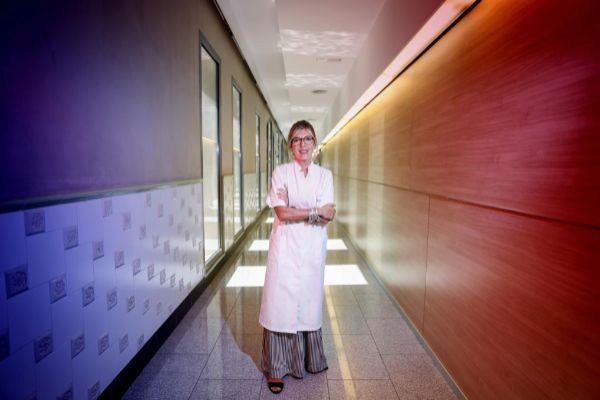Anna Veiga likes to explore, peer into the future, mark the path. He demonstrated it in 1984, at the beginning of his career, by becoming the scientific mother of the first test tube girl in Spain. And he did it again 20 years later, when, from assisted reproduction, he made the leap to stem cell research. This "natural evolution", he says, has allowed him to be at the forefront of two authentic revolutions that he continues to develop from his position as head of the Bank of Cell Lines at the Center for Regenerative Medicine in Barcelona and scientific director of the Reproductive Medicine Service from Dexeus Woman. "I feel privileged," he says, moving his hands emphatically. And the bracelets that adorn your wrists underline each of your words.
I imagined 35 years ago, when Victoria Anna was born, what would the future be like? No, not at all. We knew we were laying the pillars of assisted reproduction in Spain, but we couldn't even imagine where we would be three decades later. In Dexeus alone, about 20,000 children have been born by in vitro fertilization since then. Globally we are talking about eight million children. Between 5 and 7% of children have been born thanks to in vitro fertilization. In general, advances in Medicine are still very fast. We cannot imagine where we will arrive. Which lines of research with stem cells are the most promising There are clinical trials underway with pluripotent stem cells and also with mesenchymal, for example in retinal problems, diabetes, spinal cord injury or heart. There are also studies in Parkinson's, but in a very early stage. In this sense, it is important that any approach has all security guarantees, that there is a scientific basis on which to support that application. Because excesses have been committed and false expectations have been given about the use of cell therapy, using it indiscriminately. And this can be very dangerous. An example is the case of the two women who went blind after a transplantation of mesenchymal cells in the retina. Is solving the neurodegenerative diseases the great hope? Yes, in these diseases there is a part of an organ that has stopped working. The idea is that instead of trying to solve that problem with medications, we can use healthy cells that replace those in poor condition. We still have to solve a series of technical problems, but progress is being made. In that sense, the research being done in Regenerative Medicine on the role of aging is also essential. Can aging be slowed down? Will we rejuvenate? The concept of rejuvenating would squeak. The study of aging has to serve us to understand the mechanisms of degenerative pathologies and thus try to solve them. The goal is not to turn a person of 60 into a person of 45, but to try to stop the problems associated with aging. Our life expectancy is longer, but what is the use of living until 97 if you have spent the last 15 years in bed? The goal is not to live forever and rejuvenate, what we have to achieve is to live well, with quality of life. Will we get to see cloned human beings? I really don't know anyone who deserves to be cloned. But even if we tried to clone Messi, we would not succeed, because we are not just genetic material. We are not just genes. 50% is the DNA we have, but the other 50% is determined by how we are educated, the environment we have around, what we live ... Each one is unrepeatable. Do all the biomedical advances we are attending require a greater ethical debate? I think so, which is something we should put on the table. For example, in terms of genomic editing. The consensus is that if it is a serious illness there is no doubt that it would be worthwhile to correct it if there are no other easier systems, such as preimplantation diagnosis, to avoid it. But the line that demarcates what a serious illness can be subjective. Professionals, philosophers, bioethics experts, different sources should contribute to the debate. And in the end it has to be the people who, deciding their representatives at the political level, make the decisions. How do you see the situation of Science in Spain? We are very far from an ideal situation. In 2008, with the discovery of pluripotent stem cells, Japan understood that resources had to be devoted to that research, because that meant investing in the future of the country. However, in Spain, the first thing that was cut during the crisis was the science budget. This shows that it has not yet been understood how a country has to move forward.According to the criteria of The Trust Project
Know more- Science and Health
Research An anticoagulant drug, possible Alzheimer's therapy
Stories José Luis, the man who tried to commit suicide four times: "I just wanted to stop suffering"
HealthHealth will finance the HIV preventive pill after having proven its "effectiveness" in other countries

